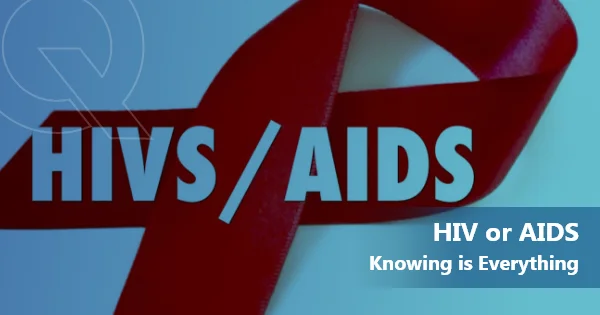A lot of people are confused between HIV and AIDS. Despite being similar to an extent, there are a few differences between them which everyone should know. Since, there is so much stigma attached to these terms in our society, ignoring any awareness and knowledge about them would only lead to discrimination.
Human Immunodeficiency Virus or HIV is a virus that affects a person’s immune system, making them more vulnerable to infections and diseases. It is found in the infected person’s body fluids (blood, semen and vaginal fluids, and breast milk). The virus can be passed from one person to another through blood and sexual contact and also, by an infected mother to her child during pregnancy, at the time of delivery and during breastfeeding.
AIDS is the condition that occurs after being infected with HIV. It is the final stage of the HIV. At this stage, the virus has progressed to a level where the body has lost significant number of white blood cells resulting in a weakened immune system.
Therefore, HIV is a virus that causes AIDS. Not everyone infected with HIV advances to this stage. Though there is still no cure for HIV/AIDS, but we can always protect ourselves from progressing to AIDS. If detected early and intervened with medication, the pace of the virus spreading all over the body can be slowed down which can even delay the onset of AIDS.
Contents
How can one get infected with HIV virus?
HIV can be transmitted through –
- Sexual transmission: Sexual contact between two people that involves sexual secretions from rectal, genital or oral mucous membrane, unprotected sex or sharing sex toys with someone infected with HIV are the main causes of this transmission.
- Perinatal transmission: HIV can be passed on from an infected mother to her child during pregnancy, at the time of delivery or during breastfeeding.
- Blood Transmission: The virus can also be transmitted when one shares or reuses needles and syringes contaminated with HIV-infected blood.
How can one lower the risk of getting HIV?
- Practice safe sex – Choosing less risky sexual behaviour and using condoms regularly and correctly can help lower the risk of getting infected.
- Know your partner’s health – Talk to your partner if he/she has already been tested for. Also, reduce the number of partners you chose to be physical with.
- Get tested for other STDs and encourage your partner to do the same – If you are sexually active, get tested at least once a year.
- Don’t share needles – Firstly, taking drugs is not the right thing at all. Sharing of needles and syringes should be avoided in any case.
At one time in history, a diagnosis of HIV or AIDS was considered a death sentence. Thanks to research and development of new treatments today, people diagnosed with HIV and AIDS are living long and productive lives. However, there is still a vital need to increase awareness, fight prejudice and improve education.
hey






